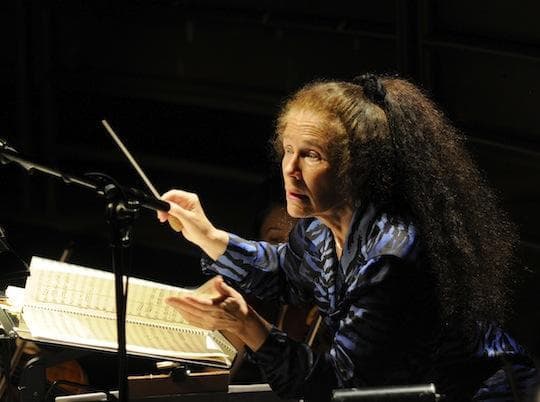Advertisement
Forget Falstaff, Midsummer Opera Shines Light On 'The Merry Wives'
BOSTON — The look on Susan Davenny Wyner’s face as she conducts the rehearsal for Boston Midsummer Opera’s upcoming production of “The Merry Wives of Windsor” is one of pure passion. A smile forms at the corner of her lips and she waves her arms enthusiastically, nodding her head, even humming along at times, as she follows the score and singers before her.

The passion Wyner has for “Merry Wives” is unsurprising given the way composer Otto Nicolai weaves together spirited drama and tender romance, borrowing styles from both the classical and romantic eras to create his 1849 master work. This mixture of styles is what, to Wyner, makes Nicolai’s opera unique. While Verdi’s more well known opera “Falstaff,” written 44 years after “Merry Wives,” is characterized by a familiar Italian gusto, Nicolai’s embraces Mozart classicism, a romanticism associated more with Italian opera, traditional Hungarian dances, spoken dialogue, and many other musical idioms.
Unlike Nicolai’s original opera, traditionally performed in German, BMO’s production of “Merry Wives” (July 24, 26 and 28 at the Tsai Performance Center) is translated into English, as in all its other productions. Asked if she thought the translation would take away from the original power and meaning of the opera, Wyner acknowledged that, “Written music needs to be inflected with a sense of style” and that while the lyrics are in English, there still exists a German identity to them. The BMO’s translated version simply adds a “certain kind of intervention — in a good way.”
The opera also features a rare onstage collaboration between the orchestra and singers. Nicolai’s decision to forgo the pit and place the orchestra on stage is significant, as it allows for a sort of unity between musicians. Often, the orchestra is viewed simply as an accompaniment to the singers; this time, the orchestra literally works beside the singers, providing not just the musicians, but the audience, with a fresh and perhaps even more musically rich performance.
Another bonus of “Merry Wives” is its portrayal of women. Not only are Nicolai’s female characters blessed with intelligence and wit, allowing them to triumph over the oft-blundering men, but they are also the ones who ultimately drive the plot’s moral, which seeks to expose lies, but ultimately demonstrates forgiveness. And, paired with the sharp, no-nonsense dialogue of the women are — as Wyner puts it — “old fashioned arias that they turn into their own special performance.” Unlike many operas that end with a big showy aria (typically sung by a male character), Nicolai’s “Merry Wives” closes softly, but powerfully, with a trio of women who inevitably grant forgiveness and, in Wyner’s words, “dare to end it with a moment of sweet, enlightened transcendence.”
Because the style of Nicolai’s opera is so distinctly mixed, rehearsals for “Merry Wives” have been somewhat of a learning experience for all involved. The singers, themselves, are a diverse collection of nationally and internationally known performers (Dean Elzinga, Richard Lugo, and Martha Guth) and up-and-comers. With Wyner and director Antonio Ocampo-Guzman as guides, they seem to have arrived at a unified way of attacking the opera’s challenges.
The result is, as Wyner says, an opera of “wonderful dialogue interwoven with extraordinary music.”
The Boston Midsummer Opera’s production of Otto Nicolai’s “The Merry Wives of Windsor” will be held in the Tsai Performance Center at Boston University. Performances are July 24 and 26 at 7:30 p.m., and July 28 at 3 p.m. A pre-concert lecture by Richard Dyer, former Boston Globe classical music critic, will take place on hour before performance time.